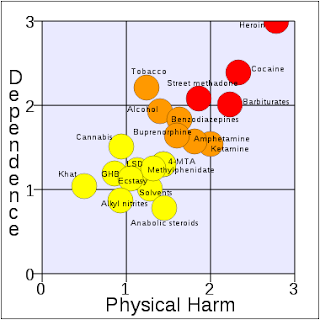 Christian Perring of Dowling College, who edits the helpful "Metapsychology Online Reviews" site, presented an interesting paper at Cambridge Hospital, MA last week about moral responsibility of addicts and others who may not have full control of their harmful actions.
Christian Perring of Dowling College, who edits the helpful "Metapsychology Online Reviews" site, presented an interesting paper at Cambridge Hospital, MA last week about moral responsibility of addicts and others who may not have full control of their harmful actions. The thrust of the argument was that addicts can be morally blameworthy for their harmful behaviors even if they were compelled by the addiction. The rationale was that the addict behaves in a way that he knows will cause harm. The relationship, then is damaged, and the person hurt feels blame towards the person who has acted harmfully. The addict, or the mentally ill person, is still blameworthy for their actions because 1) the person knew that the action would harm the other person and 2) they performed the action nonetheless.
The reaction to this conclusion was surprisingly receptive. However, as the issue was pushed, it seems that there was more of a gradient of blameworthiness. For instance, someone who performs a malicious act purely for malice is very blameworthy. On the other end of the spectrum, the epileptic who happens to hit someone is not blameworthy at all, because he had no intention of performing the action.
The reaction to this conclusion was surprisingly receptive. However, as the issue was pushed, it seems that there was more of a gradient of blameworthiness. For instance, someone who performs a malicious act purely for malice is very blameworthy. On the other end of the spectrum, the epileptic who happens to hit someone is not blameworthy at all, because he had no intention of performing the action.
Thanks Zach. That was a good talk. Thanks to Dr. Phillips for driving us!
ReplyDeleteHere's just more evidence for a "gradation" of moral responsibility. Steinberg (Temple University) was just interviewed by NY times making the claim that *teenagers* are somehow different from adults, and consequently, "When it comes to crime, they are less responsible for their behavior than adults." (See http://www.nytimes.com/2009/12/01/science/01conv.html?partner=rss&emc=rss for the full interview)
I suppose the law represents this. Currently, a teenager under the age of 15 cannot be given the death penalty by federal law. Also, as any juvenile delinquent knows, one's first non-felony conviction can be "deferred" or expunged from your record.
But the Steinberg's claim is based on brain development, which doesn't reach maturity (and then decline) until age 25. With regard to teenagers, their "impulse control" is not yet developed. Hence, many of their actions "could not have been otherwise".
What Steinberg's claim does, I think, is put some moral responsibility on the parents/guardians of teenagers. I wonder if the same isn't true of addicts--is the state, as the "guardian", partially at fault for the harm they cause?